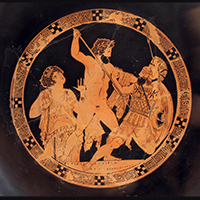Hubris and Sciences

“The speed of communications in contemporary times, combined with the widespread application of social media and easy access to large groups of people, might predispose to both collective and individual hubristic decision making.”
Diamandis, E. P., Bouras, N.
F1000Research, 2018. 7:133
Image: CC BY 3.0
“There has been an increasing awareness of the importance of leadership and decision making, including scientists and academics, over recent times.
“By whom and how decisions are made can have serious implications across all levels of society. Several people have been successful in their life and have been inflicted by excessive pride and self-confidence. There are times when the manifestations of such behaviours demonstrate noticeable signs of narcissism and on extreme cases, hubris.
“Hubris is an old concept originated from the Greek mythology. The risk of hubris affects politicians, leaders in business, scientists, academia, the military, entertainers, athletes and doctors (among many others).
“Power, especially absolute and unchecked power, is intoxicating and is manifested behaviourally in a variety of ways, ranging from amplified cognitive functions to lack of inhibition, poor judgment, extreme narcissism, deviant behaviour, and even cruelty. Hubristic behaviour of overconfidence, extreme pride together with an unwillingness to disregard advice makes powerful people in leadership positions to over-reach themselves with negative consequences for themselves and others.
“As the dangerous consequences of hubristic behaviours become more apparent and well described it is imperative that individuals, organisations and governments act to prevent such phenomena. Responsible leaders, including acclaimed scientists should exercise greater humility to the complexity and inherent uncertainty of their activities and strive to seek out and challenge hubristic behaviours.”
Read the full opinion piece here: Hubris and Sciences






Leave a comment
Back to the top